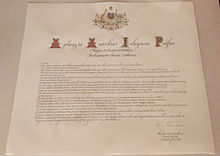
An apology is a voluntary expression of regret or remorse for actions, while apologizing (apologising in British English) is the act of expressing regret or remorse.[1] In informal situations, it may be called saying sorry. The goal of an apology is generally forgiveness, reconciliation, and restoration of the relationship between the people involved in a dispute.[2]
The nature of an apology involves at least two people where one has offended the other.[3] Alternatively, it can involve two groups of people, one having previously offended the other. This is seen in the figure, with the Australian Government (an institution) apologizing for previous wrongs to the Indigenous (a large ethnic group).
According to the attribution theory, giving an apology as early as possible leads to less conflict during the discussion and increases communication satisfaction. The way the apology is given affects the outcome and the process of forgiveness.[4] For example, putting genuine emotion into an apology generally helps resolve disputes more quickly and helps rid negative emotions faster. When responding to a crisis, there are multiple implications and ethical standards organizations and groups might follow.[5]
- ^ Chiles, Benjamin W.; Roloff, Michael E. (6 August 2014). "Apologies, Expectations, and Violations: An Analysis of Confirmed and Disconfirmed Expectations for Responses to Apologies". Communication Reports. 27 (2): 65–77. doi:10.1080/08934215.2014.890735. S2CID 143683319.
- ^ Cite error: The named reference
:03was invoked but never defined (see the help page). - ^ Opt, Susan K. (July 2013). "Apology as Power Intervention: The Case of News of the World". Western Journal of Communication. 77 (4): 424–443. doi:10.1080/10570314.2013.767471. S2CID 145731184.
- ^ Ebesu Hubbard, Amy S.; Hendrickson, Blake; Fehrenbach, Keri Szejda; Sur, Jennifer (May 2013). "Effects of Timing and Sincerity of an Apology on Satisfaction and Changes in Negative Feelings During Conflicts". Western Journal of Communication. 77 (3): 305–322. doi:10.1080/10570314.2013.770160. S2CID 143164158.
- ^ Timothy Coombs, W.; Frandsen, Finn; Johansen, Winni (12 October 2010). "Apologizing in a globalizing world: crisis communication and apologetic ethics". Corporate Communications. 15 (4): 350–364. doi:10.1108/13563281011085475.